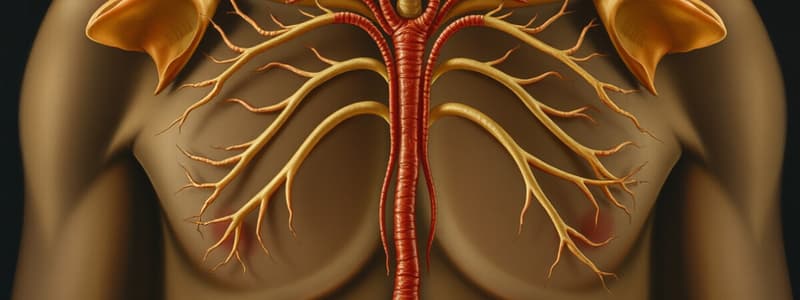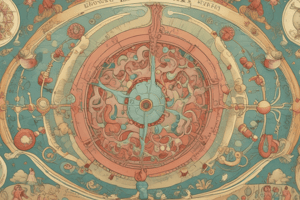Podcast
Questions and Answers
What do pancreatic islets primarily regulate?
What do pancreatic islets primarily regulate?
- Digestive enzyme production
- Hormone secretion
- Blood glucose levels (correct)
- Blood pressure
What hormone do alpha cells release when blood sugar is low?
What hormone do alpha cells release when blood sugar is low?
- Glucagon (correct)
- Cortisol
- Adrenaline
- Insulin
What is the primary function of insulin released by beta cells?
What is the primary function of insulin released by beta cells?
- To increase glucose reuptake (correct)
- To increase blood sugar levels
- To break down glycogen
- To decrease glucose reuptake
What percentage of pancreatic tissue do pancreatic islets constitute?
What percentage of pancreatic tissue do pancreatic islets constitute?
Which cells in the pancreatic islets help regulate insulin production?
Which cells in the pancreatic islets help regulate insulin production?
Which scenario would trigger the release of glucagon?
Which scenario would trigger the release of glucagon?
What is the function of glucagon in regulating blood sugar?
What is the function of glucagon in regulating blood sugar?
What type of cells are NOT found in pancreatic islets?
What type of cells are NOT found in pancreatic islets?
When blood sugar is high, what is the response of the pancreas?
When blood sugar is high, what is the response of the pancreas?
What role do acini cells play in the pancreas?
What role do acini cells play in the pancreas?
Flashcards are hidden until you start studying
Study Notes
Overview of the Endocrine System
- Comprises 12 glands that produce approximately 50 hormones acting as chemical messengers.
- Hormones are secreted directly into the bloodstream, affecting target tissues or organs to regulate bodily functions.
- Integrates with the nervous system, but operates at different speeds; nerves respond rapidly, while hormones can have prolonged effects lasting hours to years.
- Regulates metabolism, fluid balance, growth and development, and sexual reproduction.
Key Glands and Their Functions
Hypothalamus and Pituitary Gland
- Hypothalamus connects the nervous and endocrine systems, translating neural signals into hormonal responses.
- Pituitary gland, known as the "master gland," controls other endocrine glands via hormones. It consists of anterior and posterior lobes.
- Anterior lobe produces seven major hormones; the posterior lobe releases two hormones from the hypothalamus.
Thymus Gland
- Produces progenitor cells that mature into T-cells, essential for immune response.
- T-cells help destroy infected or cancerous cells and support the growth of other immune organs.
Adrenal Glands
- Located atop each kidney, made of a cortex (produces steroid hormones like cortisol and aldosterone) and medulla (produces epinephrine and norepinephrine).
- Regulates blood substance levels and triggers "fight-or-flight" responses during stress.
Kidneys
- Produce hormones such as vitamin D, which aids calcium absorption and bone health, and erythropoietin (EPO), stimulating red blood cell production when oxygen levels are low.
Reproductive Glands
- Ovaries and testes are the main sex glands, producing hormones that govern sexual reproduction and development from puberty onward.
- Testes produce androgens (e.g., testosterone) and ovaries produce estrogens and progesterone.
Pineal Gland
- Pine cone-shaped gland located in the diencephalon, secretes melatonin in darkness to regulate sleep patterns, affected by light exposure.
Thyroid and Parathyroid Glands
- Thyroid gland is vital for metabolism, glucose regulation, and protein synthesis; secretes hormones like calcitonin to manage blood calcium levels.
- Parathyroid glands secrete parathyroid hormone (PTH), which releases calcium from bones when blood calcium levels are low, complementing calcitonin.
Role of Iodine
- Essential for thyroid hormone production; must be acquired through diet as the body cannot produce it.
Pancreas
- Contains pancreatic islets (islets of Langerhans) that produce hormones regulating blood sugar levels: glucagon raises glucose levels, while insulin lowers them.
Summary
- Hormones play a crucial role in maintaining homeostasis and regulating various physiological processes across the body, emphasizing the intricate balance within the endocrine system.
Studying That Suits You
Use AI to generate personalized quizzes and flashcards to suit your learning preferences.




